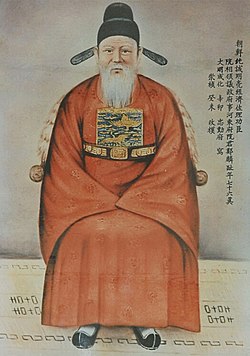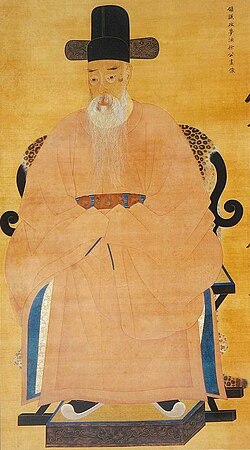Top Qs
Timeline
Chat
Perspective
Yŏngŭijŏng
Title of the Chief State Councillor of Joseon From Wikipedia, the free encyclopedia
Remove ads
The Yŏngŭijŏng (Korean: 영의정; Hanja: 領議政; pronounced [jʌŋ.ɰi.dʑʌŋ]) or Chief State Councilor was a member of the State Council of Joseon and the highest government position in the Joseon period of Korean history.[1][2] The Yŏngŭijŏng held roles similar to a modern-day prime minister of a presidential system.[3] As the senior member of the Chief State Council, the Yŏngŭijŏng participated in the administration of general government affairs alongside the Chwaŭijŏng and Uŭijŏng.

The title was created in 1400 with the creation of the State Council. Existing for over 500 years, the function was handed over in 1895 during the Kabo Reform to the newly-formed position of the Prime Minister of the Korean Empire.[4][3] Only one official, usually an elder who had previously served as Chwaŭijŏng, was allowed to assume the position of Yŏngŭijŏng. The Yŏngŭijŏng was also referred to as Yŏngsang (영상; 領相; lit. leading minister of state), Sangsang (상상; 上相; lit. upper minister of state), Sugyu (수규; 首揆; lit. head premier) or Wŏnbo (원보; 元輔; lit. primary assistant).[3]
Although the title of Yŏngŭijŏng was legally defined as the highest post in charge of all state affairs, its practical roles and powers shifted drastically throughout history as the roles of the State Council were not clearly defined in the Kyŏngguk taejŏn. During the early years of Joseon, the Yŏngŭijŏng saw limited roles in government as the Six Ministries reported directly to the king.
Remove ads
History
Summarize
Perspective
Establishment
Upon its founding in 1392, the state of Joseon initially inherited the state structure of its predecessor Goryeo (918–1392). In 1400, the second year of his reign, King Jeongjong reformed the Top'yŏngŭisasa ("Privy Council"[5]), which was previously the supreme administrative body of the Goryeo dynasty, to the State Council. The head of the State Council was given the title "Yŏngŭijŏng pusa" (영의정부사; 領議政府事). As both functions of State Council got stronger, and its system was further revised, "Yŏngŭijŏng pusa" was renamed to "Yŏngŭijŏng" in a firm establishment of the office.[3]
In 1466, the position was officially put in statutory form with the finalization of the Kyŏngguk taejŏn.[6][7] The Yeongjuijeong title was generally conferred on a senior minister who had previously served as Chwaŭijŏng (Left State Councilor),[8] a post immediately below that of Yŏngŭijŏng, but higher than that of Uŭijŏng (Right State Councillor).[9] The three councilors were collectively known as the "Chŏngsŭng" (정승; 政丞),[10] or "Samŭijŏng" (삼의정; 三議政; lit. Three High Councillors).[3]
Changes in the role
Until April 1436, the 18th year of Sejong the Great's reign, Chwaŭijŏng and Uŭijŏng concurrently served as Panijosa (判吏曹事) and Panbyeongjosa (判兵曹事) respectively, so that they governed personnel affairs of yangban (the literary and military nobility).
Yŏngŭijŏng continued to exist as an honorary post, and so only managed to contemplate and adjust diplomatic documents or re-examine the cases of condemned people.
However, when Hwang Hŭi was appointed as "Yŏngŭijŏng pusa" in that same year, Sejong modified the government system to strengthen the power of Chŏngsŭng from the Six Ministries centered system. With the reform, Sejong noted that a situation in which three highest senior advisors could not participate in the state affairs contravened the original intention to have them as the high state councillors.[3]
During the reform, Six Ministries conferred with State Council regarding the responsibilities of each minister. State Council discussed legitimacy of the issues, and then reported to the king. After receiving an approval from the king, State Council returned to Yujo to enact the assigned affairs. As a result, Yŏngŭijŏng came to participate more actively in the representative work as the head of State Council. However, other ministerial duities, such as those of the ministries Ijo[11] and Pyongjo (Ministry of Military Affairs[12]) to implement personnel management, Pyongjo's mobilization of soldiers, Hyŏngjo (Ministry of Punishments[13])'s right to handle all criminals other than condemned people, were still directly operated by the related ministers.[3]
When Prince Suyang usurped the place of his nephew, King Danjong, the function of Yŏngŭijŏng was relegated to its previous powerless position. This was because when the King Sejo was still a prince, his actions were greatly restricted by his political rivals, Yŏngŭijŏng, Hwangbo In and Chwaŭijŏng, Kim Chongsŏ. So during the reigns of King Seongjong and Jungjong, there were several proposals to restore the former powers of State Council, but those suggestions were not implemented.[3]
Major affairs of the state were discussed when Bibyeonsa was established in 1558 (during the 10th year of King Myeongjong's reign). The three High Councillors attended meetings only as "Tojejo" (Supreme Commissioner[14][15]). So the power of Yŏngŭijŏng tended to be increased or decreased, depending on the political atmosphere of the times, such as the degree of the king's power, the relationship between State Council and Six Ministries, the establishment of the Border Defense Council, the later administration of Kyujanggak (the Royal Library), the conflicts between political parties, and the advancement of "in-law government" (세도정치; 勢道政治[16]), among others. Regardless, the title "Yŏngŭijŏng" continued as the apex in the bureaucratic system throughout the entire Joseon period.[3]
Remove ads
List of Joseon Yŏngŭijŏng
Summarize
Perspective
Remove ads
Footnotes
- Dates have been converted to Gregorian using the converter tool provided by the Korea Astronomy and Space Science Institute.[17]
- According to the Veritable Records of Injong, Hong Ŏnp'il was appointed Chief State Councilor on 4 February 1545. However, the Veritable Records do not specify his date of resignation. On an entry dated 22 February 1545, however, he is denoted as First Minister-without-Portfolio (영중추부사), an honorary office which served as the titular head of the Military Affairs Commission (중추원) and was often assumed by figures who had previously served as a State Councilor. Judging by these records, it may be inferred that Hong did serve as Chief State Councilor from 4 February to some point before 22 February 1545.[citation needed]
- Various records regarding the dates of tenures of Chief State Councilors during Seonjo's reign have been lost from the Veritable Records of Seonjo due to the Imjin War (1592–1598). While entries on the Revised Veritable Records of Seonjo note the appointment and resignation of some of these Councilors, many of these entries only cite lunar months, not specific dates.[134]
References
Wikiwand - on
Seamless Wikipedia browsing. On steroids.
Remove ads


















































